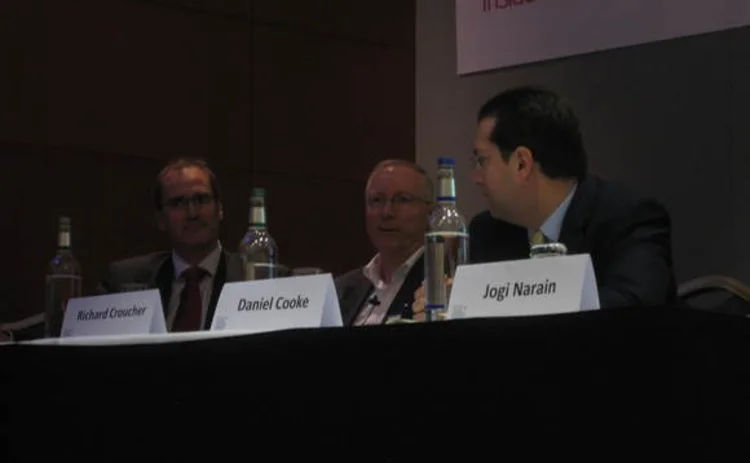Tech Panel: Act ‘Appropriate,' But Speed Still Needs Spend

"You can get a long way now by buying standard products, whereas in the past you needed to do a lot of customization. You can still get benefits from that customization, but the top end [of off-the-shelf products] is higher now," said Richard Croucher, European lead of high-frequency engineering at Barclays. "You can get a long way by buying solutions off the shelf. You can buy your way into the top 10. But if you want to be in the top three, you probably have to build things yourself."
Daniel Cooke, infrastructure service lead in UBS' group technology division, said that every project must aim to be fit for a specific purpose, rather than aiming too high. "We have to be less dogmatic about how ‘Our trading system has to be the best of the best,' and look at the liquidity in each market.... For example, if you're looking at the credit markets, you would probably want a more commoditized solution. So we talk to departments to determine whether they understand the rates and requirements," Cooke said.
Similarly, panelists urged attendees to assess how appropriate specific business areas are for adopting new technologies, such as virtualization. "As an industry, we are getting much better about things like virtualization, which started out as general-purpose computing─which is not what our industry is," said Francis Madden, executive director at CIBC. "Before, virtualization was a no-no. Now, we are being more sensible, and looking at what applications and parts of the stack may be more appropriate to use it," added Barclays' Croucher.
Panelists cited the emerging use of microwave technologies for low-latency data distribution, which are becoming a "must-have" for some areas, despite their high cost, limited bandwidth and being subject to weather interference. "On the one hand, it is just another transport mechanism, but on the other hand... if you don't get it, you might miss out completely because there is such limited supply," said Jogi Narain, chief technology officer of FGS Capital, who moderated the discussion.
But for those areas that are performance-sensitive, technology can make or break a trading opportunity. "How aggressive the business is in pricing may depend on their confidence that they won't saturate your messaging backbone... and that depends on your ability to leverage tools to demonstrate its consistency and reliability through the stack," Croucher said, adding that he has seem firms withdraw from markets where they are unable to obtain sufficiently high-performance connectivity.
Only users who have a paid subscription or are part of a corporate subscription are able to print or copy content.
To access these options, along with all other subscription benefits, please contact info@waterstechnology.com or view our subscription options here: http://subscriptions.waterstechnology.com/subscribe
You are currently unable to print this content. Please contact info@waterstechnology.com to find out more.
You are currently unable to copy this content. Please contact info@waterstechnology.com to find out more.
Copyright Infopro Digital Limited. All rights reserved.
As outlined in our terms and conditions, https://www.infopro-digital.com/terms-and-conditions/subscriptions/ (point 2.4), printing is limited to a single copy.
If you would like to purchase additional rights please email info@waterstechnology.com
Copyright Infopro Digital Limited. All rights reserved.
You may share this content using our article tools. As outlined in our terms and conditions, https://www.infopro-digital.com/terms-and-conditions/subscriptions/ (clause 2.4), an Authorised User may only make one copy of the materials for their own personal use. You must also comply with the restrictions in clause 2.5.
If you would like to purchase additional rights please email info@waterstechnology.com
More on Data Management
New working group to create open framework for managing rising market data costs
Substantive Research is putting together a working group of market data-consuming firms with the aim of crafting quantitative metrics for market data cost avoidance.
Off-channel messaging (and regulators) still a massive headache for banks
Waters Wrap: Anthony wonders why US regulators are waging a war using fines, while European regulators have chosen a less draconian path.
Back to basics: Data management woes continue for the buy side
Data management platform Fencore helps investment managers resolve symptoms of not having a central data layer.
‘Feature, not a bug’: Bloomberg makes the case for Figi
Bloomberg created the Figi identifier, but ceded all its rights to the Object Management Group 10 years ago. Here, Bloomberg’s Richard Robinson and Steve Meizanis write to dispel what they believe to be misconceptions about Figi and the FDTA.
SS&C builds data mesh to unite acquired platforms
The vendor is using GenAI and APIs as part of the ongoing project.
Aussie asset managers struggle to meet ‘bank-like’ collateral, margin obligations
New margin and collateral requirements imposed by UMR and its regulator, Apra, are forcing buy-side firms to find tools to help.
Where have all the exchange platform providers gone?
The IMD Wrap: Running an exchange is a profitable business. The margins on market data sales alone can be staggering. And since every exchange needs a reliable and efficient exchange technology stack, Max asks why more vendors aren’t diving into this space.
Reading the bones: Citi, BNY, Morgan Stanley invest in AI, alt data, & private markets
Investment arms at large US banks are taken with emerging technologies such as generative AI, alternative and unstructured data, and private markets as they look to partner with, acquire, and invest in leading startups.








